Related Research Articles

Palau, officially the Republic of Palau, is an island country in the Micronesia subregion of Oceania in the western Pacific Ocean. The republic consists of approximately 340 islands and connects the western chain of the Caroline Islands with parts of the Federated States of Micronesia.

Palau was initially settled around 1000 BC.

The Flag of Palau was adopted on 1 January 1981, when the island group separated from the United Nations Trust Territory. As with the flags of several other Pacific island groups, light blue is the color used to represent the ocean and the nation's place within it. While this puts Palau in common with the Federated States of Micronesia and other neighboring island groups, the disc on the flag is off-centre like that of the flag of Bangladesh, but in this case the disk represents the moon instead of the sun. The current flag was introduced in 1981 when Palau became a republic.

Palau has a bicameral legislature, the Palau National Congress, consisting of the House of Delegates and the Senate of Palau, which both sit at the capitol complex in Ngerulmud, Melekeok State. The House of Delegates has 16 members, each serving four-year terms in single-seat constituencies. The Senate has 13 members, also serving four-year terms in multi-seat constituencies. In the last elections, held in 2020, only non-partisans were elected; no political parties exist.

Peleliu is an island in the island nation of Palau. Peleliu, along with two small islands to its northeast, forms one of the sixteen states of Palau. The island is notable as the location of the Battle of Peleliu in World War II.
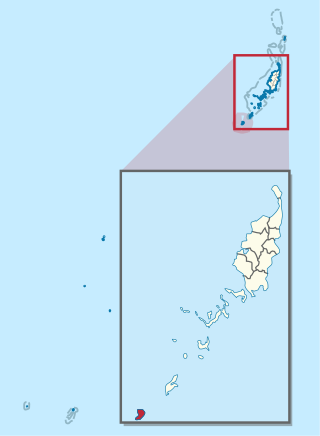
Angaur, or Ngeaur in Palauan, is an island and state in the island nation of Palau.

Ngchesar, also known as Oldiais, is one of the sixteen states of the nation of Palau in Oceania.
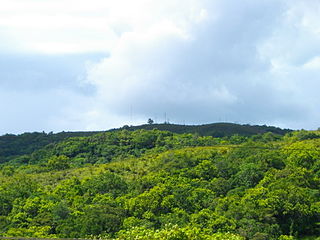
Ngeremlengui is one of Palau's sixteen states. It has a population of 349, and is just west of the capital in Melekeok state. Among the 16 states of Palau, it’s the one with the lowest density but the one with the most neighbor states. It’s also the seventh most populous state.
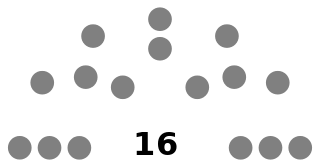
The House of Delegates of Palau is the lower house of the Palau National Congress, Palau's bicameral legislature. The Senate of Palau is the upper house. The House of Delegates has 16 members, each serving four-year terms in single-seat constituencies. Each state represents one constituency. No political parties exist. The last election was held on 3 November 2020.
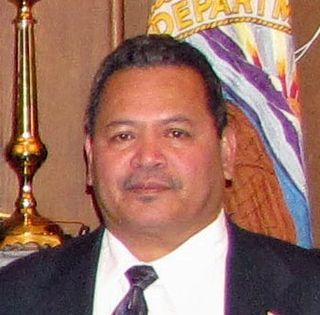
Hersey Kyota is a Palauan politician and diplomat who has served as the ambassador of Palau to the United States since 1997. He is the current dean of the Diplomatic Corps in Washington, D.C., as the longest-serving ambassador to the United States.

Palau–United States relations are bilateral relations between the sovereign nations of Palau and the United States. Palau has an embassy in Washington, DC, whilst the United States has an embassy in Koror. The current US Ambassador to Palau Joel Ehrendreich.
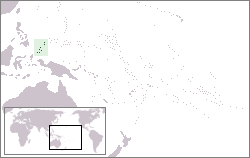
The following is an alphabetical list of topics related to the Republic of Palau.
There is a small Japanese community in the Pacific Island country of Palau, which mainly consists of Japanese expatriates residing in Palau over a long-term basis. A few Japanese expatriates started to reside in Palau after it gained independence in 1994, and established long-term businesses in the country. Japanese settlement in Palau dates back to the early 19th century, although large scale Japanese migration to Palau did not occur until the 1920s, when Palau came under Japanese rule and administered as part of the South Seas Mandate. Japanese settlers took on leading administrative roles in the Japanese colonial government, and developed Palau's economy. After the Japanese surrender in 1945, virtually all of the Japanese population was repatriated back to Japan, although people of mixed Japanese-Palauan descent were allowed to remain behind. People of Japanese-Palauan descent constitute a large minority of Palau's population as a result of substantial intermarriage between the Japanese settlers and Palauans. They generally identify with, conforming to cultural norms and daily lives with the Palauans.
The sport of baseball is widely played in Palau, having been introduced by the Japanese during their occupation of the island nation. The highest level of league play in Palau in represented by Palau Major League (PML), which is overseen by the Belau Baseball Federation. The country is represented in international play by the Palau national baseball team.

The Congress of Micronesia was a bicameral legislature in Trust Territory of the Pacific Islands from 1964 to 1979.

Palau and Serbia maintain diplomatic relations established in 2018.
Palauan nationality law is regulated by the 1980 Constitution of Palau, as amended; the 1994 Palau Citizenship Act, and its revisions; and international agreements entered into by the Palauan government. These laws determine who is, or is eligible to be, a national of Palau. The legal means to acquire nationality, formal legal membership in a nation, differ from the domestic relationship of rights and obligations between a national and the nation, known as citizenship. Palauan nationality is typically obtained either on the principle of jus soli, i.e. by birth in Palau or under the rules of jus sanguinis, i.e. by birth abroad to parents with Palauan nationality. It can be granted to persons with an affiliation to the country through naturalization.

Regina Mesebeluu is a Palauan politician who served as a senator in the Palau National Congress between 2008 and 2012.
Ignacio Anastacio is a Palauan businessman, politician and a former speaker of the House of Delegates of Palau from January 1997 to November 2000.
Carlos Hiroshi Salii was a Palauan lawyer, politician and a former Speaker of the House of Delegates of Palau from 1981 to 1985.
References
- 1 2 3 4 Jahrbuch der Staatlichen Ethnographischen Sammlungen Sachsen. Band 43 (in German). LIT Verlag Münster. ISBN 978-3-8258-1484-7.
- ↑ United States Department of State (1967). "Report to the United Nations on the Administration of the Trust Territory of the Pacific Islands, Transmitted by the United States of America".
- ↑ "Trust Territory of the Pacific Islands in 1974". Bureau of International Organization Affairs, Office of United Nations Political Affairs.
- ↑ United States Department of State (1977). "Report to the United Nations on the Administration of the Trust Territory of the Pacific Islands".
- ↑ Shuster, Donald R. "Islands of Change In Palau: Church, School, and Elected Government, 1891-1981". University of Hawaii.
- ↑ Bureau of International Organization Affairs, Office of United Nations Political Affairs (1991). "Trust Territory of the Pacific Islands - year 1992".
- ↑ Deimel (2007), p. 225